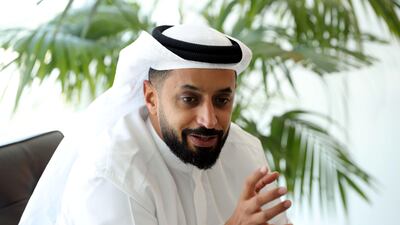The Dubai Multi Commodities Centre (DMCC), one of the world’s biggest free zones in terms of concentration of businesses, is eyeing Latin American markets to further expand its reach and attract more multinational commodities players, according to its executive chairman.
The free zone, a centre for trading of everything from tea and diamonds to derivatives, wants to establish a presence in South America, perhaps in Sao Paulo, to better court and inform regional firms about the potential of doing business in the emirate, Ahmed bin Sulayem said.
“There is a lot to capture [in those markets]. At DMCC we don’t want to overlook any market,” Mr bin Sulayem said.
“We want to tap the ones [markets] that are looking to expand, the ones that have multinationals. It would grieve me to see a top commodities player [from that region] set up somewhere else in the
Middle East.”
Mr bin Sulayem said the potential of bringing new commodities firms, especially in the coffee-trading business, is immense because firms do expand beyond their borders but many do not expand to this part of the world.
Despite language barriers, the UAE’s improving transportation and visa arrangements with some of the countries in the region will help the expansion plans.
“One thing I’ve noticed about the Latin American community is that when they want to go international, they go to Spain. We would like to explore how we can make [Dubai] more attractive for them,” he said, adding that DMCC has plans to conduct a roadshow in Spain next year where it will interact with some of the companies that have already established a presence there.
________________
Read more:
DMCC to develop a new mixed-use district adjacent to JLT
ADGM recognises the DGCX and DCCC as remote exchange and clearing house
________________
Last year, the free zone signed more than 20 memorandums of understanding, with particular focus on attracting new businesses from China and working together with organisations such as the Shanghai Gold Exchange, the China Silver Group and Mega Capital & Yunnan State Farms Province.
Beyond Latin America, Australia is next on Mr bin Sulayem’s radar.
The free zone, which grew rapidly in 2017, has added eight new companies every working day in the first nine months of this year.
The DMCC is registering new members at the same pace as it did in 2016 – a record year when 2,016 new members joined the trading hub.
More than 1,500 companies have already signed up to be part of DMCC in the first three quarters of this year, pushing the total number of firms operating out of the free zone to 14,178, a 12 per cent increase from the end-2016 level.
“To me that is even more extraordinary for 2017 because there is more uncertainty this year,” Mr bin Sulayem said. “We are at a very good position right now.”
DMCC, however, cannot lose the edge and “feel comfortable” if it wants to continue competing against older and more established trading centres such as Singapore and Hong Kong.
DMCC, which announced plans to establish a coffee centre last year, originally had expected its 4,500 square metres facility to be fully developed by March next year, but it will be finished in the third quarter of 2018. “September is the conservative delivery date,” Mr bin Sulayem said, adding that the centre’s green-bean logistics, handling and storage facility will be busy and may run out of capacity sooner than
anticipated.
“I have a feeling because of China and Africa we will have to get another coffee centre,” he said.
The centre, which is projected to handle up to 20,000 tonnes of green coffee bean per year, with estimated trade of US$100 million per year, is also expected to garner interest from Latin American countries such as Peru, Brazil, Panama, Columbia, Costa Rica and all the way up to Nicaragua, where there is a strong coffee culture.
Last year, DMCC’s Tea Centre handled more than 41.6 million kilograms of tea, while in the first half of this year, it has already traded more than 26.6 million kilograms,
according to DMCC data.


